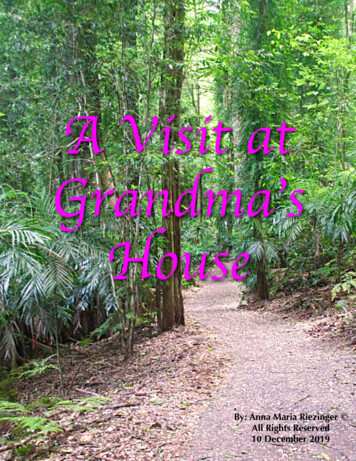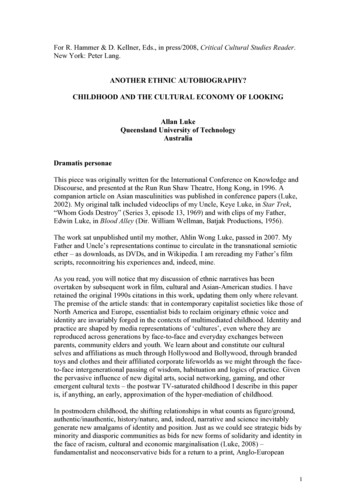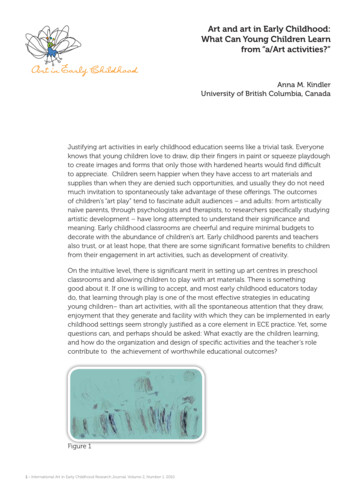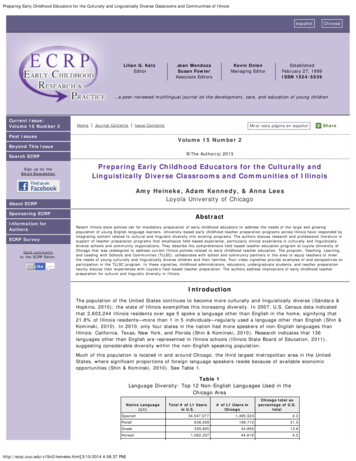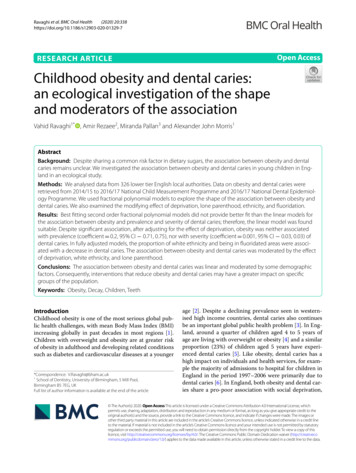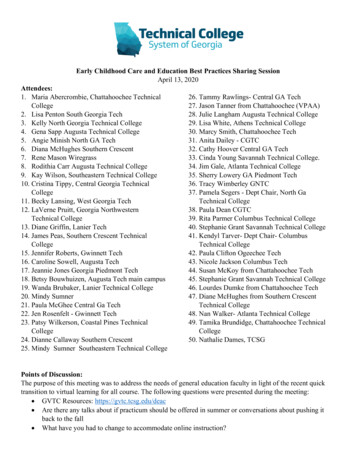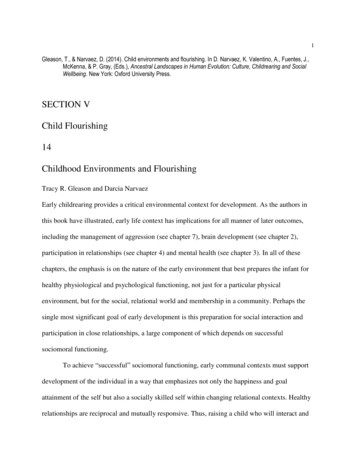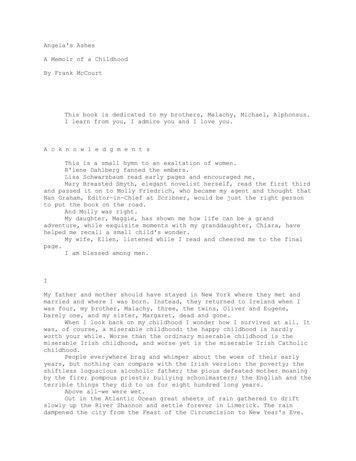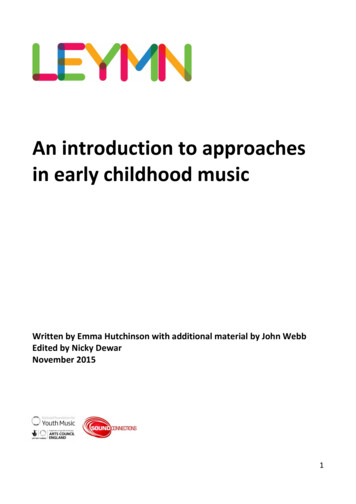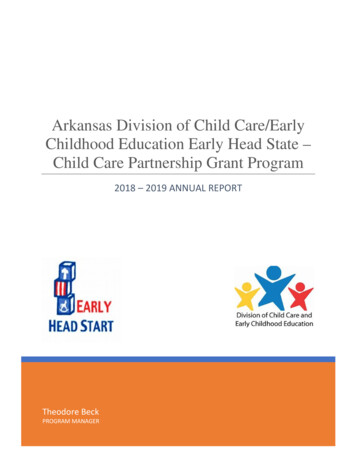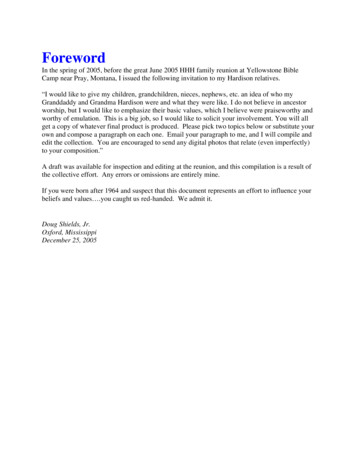
Transcription
ForewordIn the spring of 2005, before the great June 2005 HHH family reunion at Yellowstone BibleCamp near Pray, Montana, I issued the following invitation to my Hardison relatives.“I would like to give my children, grandchildren, nieces, nephews, etc. an idea of who myGranddaddy and Grandma Hardison were and what they were like. I do not believe in ancestorworship, but I would like to emphasize their basic values, which I believe were praiseworthy andworthy of emulation. This is a big job, so I would like to solicit your involvement. You will allget a copy of whatever final product is produced. Please pick two topics below or substitute yourown and compose a paragraph on each one. Email your paragraph to me, and I will compile andedit the collection. You are encouraged to send any digital photos that relate (even imperfectly)to your composition.”A draft was available for inspection and editing at the reunion, and this compilation is a result ofthe collective effort. Any errors or omissions are entirely mine.If you were born after 1964 and suspect that this document represents an effort to influence yourbeliefs and values .you caught us red-handed. We admit it.Doug Shields, Jr.Oxford, MississippiDecember 25, 2005
Grandma’s childhood and familyMy grandmother, Jane Jennings McKay Hardison, was born on April 7, 1888 in Carter’sCreek, Tennessee, where she spent the rest of her life. Her parents were Cameron HaydenMcKay and Annie Dabney Terrell McKay. Her father supported the family by farming and alsoran a phosphate mining operation that employed 50 to 75 workers. She had two sisters: Margaret(“Peg”) and Cora, (“Sissy”) and one brother: the irrepressible Robert, who we called, “UncleBuddy.”Her father, Mr. Cameron McKay, would take a corncob and wrap a one dollar bill aroundit before going to an auction. To bid, he would wave what appeared to be a large roll of bills inthe air. Leveraging, 1890’s style!According to Grandma, “Sister (Cora) was always sickly, so Mama never asked her to doanything. Peg was too small, so I was the one sent to the spring for water.” There was a cookand a number of servants (but children still worked!!), with special chores and a little boy whostood in the dining room with a stick to which strings of paper were tied. He would move thestick back and forth to keep the flies off the food.Grandma and her family pronounced their last name “Mackey,” which may have someorigins in old Scotch dialect (they were Scotch-Irish). This pronunciation was later seen assomewhat countrified by city folks who preferred the more accent on the second syllable McKaywith a “long a” sound. This set of city folks definitely included Uncle Buddy.The McKay family lived in a large, comfortable house not far from Beech Grove churchof Christ. Her family had a little more money than the neighbors: they got a telephone early on,and there was a swimming pool near the road in front of the house which was pointed out to mewhen I was a child (1960s). However, I do not believe the pool was there when Grandma wasgrowing up! The homeplace stayed in the family for some time as Uncle Buddy and his wife,Anne, raised their family there.Grandma had a ladies’ sidesaddle for horseback riding that she showed me when I was achild (it was in aged disrepair then), and she obtained a “college education,” attending NashvilleBible School, the forerunner of David Lipscomb University. Needless to say, there were fewwomen of her generation that obtained that much education. Despite their relative wealth,Grandma had to work hard as a child, like most of her generation. She told me one time that hersister, Peg was considered artistic by their parents and thus was allowed to do needlework andpaint china while the siblings cleaned, chopped, and carried! Grandma was baptized into theLord’s church as a young person, although I do not have any details.After high school, Grandma’s parents took the unusual step of sending her to Nashville tothe Nashville Bible School. She attended two years and earned some sort of degree. Herdiploma, signed by several rather famous leaders in the churches of Christ, was on the wall in herhome and now is at Harold’s. She told me that David Lipscomb himself (called “Uncle Dave”by the students) was one of her teachers. He sat in a rocking chair in the front of the classroom,and evidently was rather imperious. He made a point of inquiring about absentees. “Where isJane?” “If she is so sick, was she at dinner?” Once our Grandma was actually absent becausesome of her friends had somehow placed her on top of a very tall wardrobe (kind of a closet-typepiece of furniture), and she was afraid to jump down. While at NBS, Grandma obtained enough
education in subjects besides the Bible to obtain a job teaching “elocution” or “expression” (wewould call this subject, “speech”) at the small country school in the community of Theta, not farfrom Carter’s Creek.The aforementioned McKay telephone played a part in Grandma and Granddaddy’sromance. Since they grew up in the same community, I think they knew each other at least inpassing almost from birth. But I do not know when they started “dating.” At any rate,Granddaddy had a date with another young lady, and was seen by Grandma. He later made arather anxious telephone call to her to make sure that this did not irreparably damage theirrelationship. I wish I could tell the story as Grandma told it to me, but that is all I remember. Ican say that she certainly put him through the wringer (ringer?), and that she was not easilysatisfied with his explanation of the situation!
Granddaddy’s family and childhoodMy grandfather, Herschel Huntley Hardison, was born on December 4, 1884. His parentswere Thomas James Hardison and Caroline Alexander Hardison. He grew up in a family ofseven children—four boys and three girls. Everyone in this family had at least one nickname,which can be quite confusing when hearing and repeating old tales. The list, as best I canreconstruct it as follows:NameNickname(s)Dr. Thomas James Hardison Tover (or Tarber--many spellings have been suggested)CarolineDear or Miss CarrieScottieBigHerschelBuddyEltonBuddy EltonLeonieSee Sing, Calomine, LittleSeth (died at age 7)WayneWaynie or WinnieKatherineTattyMy great grandfather was a doctor, which conjures up images of a highly-educated, wellto-do, respected professional in the 21st century. However, in the late 19th century, things were alittle different. Medical education only took a couple of years (University of Louisville), andalthough country doctors were highly respected members of the community, they were notnecessarily wealthy. I imagine that their social status was similar to that of the modern preacheror teacher—widely admired, educated, but not extremely well paid. Dr. Hardison supplementedhis income by running a farm, which provided lots of work for his children. My grandfatherfollowed in his footsteps by running his small farm to supplement his income as a rural mailcarrier. So, in a way, my grandfather learned his vocation as a child from his father.Work on the farm was therefore a virtue as well as a necessity when Granddaddy was aboy. At least one of his feet (the left?) bore a life-long infirmity from two farm accidents—beinghit by an axe, and being run over by a wagon. This foot often caused Granddaddy to limp andwince. He only wore one type of high-top lace up shoes as long as I remember.My grandfather told several stories of his childhood, and only a few remain in mymemory. One involved his father’s use of refined language and casual labor. Once, whenvisiting the local store, Dr. Hardison spoke to a local laborer, “Uncle Joe, if you will come by myplace on Monday morning, I will pay you to haul a load of dung.” When Monday arrived,Granddaddy was detailed to the barn with a fork and wagon to assist Uncle Dave. After theycommenced digging, Uncle Joe quietly inquired, “Is this what Dr. Hardison wanted us to do?”Dr. Hardison was evidently blessed with a generous spirit. Once, he heard a sound in hisbarn and tiptoed into the main hallway to find two black men robbing his corn crib. One wasinside the crib throwing cobs into a gunny sack held by the second in the hallway. When thesack holder looked up to see the fierce visage of Dr. Hardison, he simply dropped the sack andfled noiselessly into the night. The crib robber came forth shaking, and Dr. Hardison grufflyordered him to tie up his sack and place it over his shoulder. Then he said, “Get out of here, anddon’t come back!” Thus he gave the robber a merciful gift rather than justice.On another occasion, a call came late at night for Dr. Hardison to make a house call on alarge, impoverished family. Since it was cold and rainy, Dear was opposed to his respondingand insisted he wait until daylight. “Besides,” she said, “they can’t pay you anything!”
Nevertheless, Dr. Hardison hitched his mare, Old Grace (another chapter in this narrative will bededicated to Old Grace), and set out, only to return much later. Dear awoke to find her husbandwarming his back in front of the fireplace in his bedroom.“Well,” she said, “did they pay you anything?”“Yes!”“They did! What?”And pulling a twist of (nearly worthless) homespun chewing tobacco out of coat pocket,Dr. Hardison replied, “This!” He then placed the twist on the mantle for all to see. According toGranddaddy, Dear refused to touch the payment tobacco for weeks thereafter, taking a widedetour around it whenever she dusted.Granddaddy did not follow his father into the medical profession. However, he did getsome kind of education in the public schools for lower grades, I suppose, and attended theBranham and Hughes military academy in Spring Hill for at least a year or so that correspondedto what we call “high school.” I do not know, but my impression was that he was not anenthusiastic student. One of my prized possessions is an Algebra textbook that belonged fromhim, and must date from his Branham and Hughes days. It looks as if it has never been used.Granddaddy grew up in a time when travel and communication were much more limitedthan today. Children were mainly occupied with work, and spent much less time in play andschool than children do today. And much, much less time in organized sports!Granddaddy developed close bonds with his siblings, as most of them except for hisoldest brother, Buddy Elton, lived their entire lives within a few miles of each other. BuddyElton, reputedly the “black sheep” of the family ended up moving away and living in St. Louis.In those days, boys’ pants often had buttons instead of zippers for the fly. The family ateall of their meals together, and the children helped to serve. Once, when notified that it was histurn to fetch a pan of hot biscuits from the kitchen, Buddy Elton stomped out of the dining roomand returned with the pan of bread, frustrated with his subservient role. “When I am grown up,”he announced, “I will be wealthy enough to have a button on the table. I will press that buttonand a bell will ring in the kitchen and a butler will come out with a pan of hot bread!”Dear calmly replied without missing a beat, “You will be lucky to have buttons on yourpants.”
Granddaddy’s travelsGranddaddy carried the mail on the same mail route six days a week, rain or shine. Hemilked his cows twice a day, seven days a week, rain or shine. Pretty steady work, with verylittle time off for vacations. However, Granddaddy was an adventurous sort, and did a bit oftraveling.When he was only 18 or 19 (September 1904 to June 1905), Granddaddy traveled to SanAntonio, Texas, probably by train for money and adventure. He went to see his cousin Louise,the daughter of his uncle, Richard David Hardison. While there, he saw Theodore Rooseveltcampaigning for president at the Alamo. He got a job picking strawberries, and rose to the rankof foreman. Granddaddy and strawberry picking did not last very long. He soon caught the trainhome, after having visited the Alamo (he signed the guest register) and perhaps sowing somewild oats. Huntley recalls, “It was the summer of 1964, and I worked at our Grandparent's farmfor a few weeks. One afternoon Granddaddy told me about working in Texas and traveling toSan Antonio. He visited the Alamo but was not being able to find a hotel room because all therooms were taken by people who had come to hear President McKinley. He talked about stayingout all night, "painting the town red," and a young female friend. At this point in theconversation Grandma interrupted us saying ‘Herschel, drink this and stop talking.’ Then shegave him a small glass of brown liquid, which he swallowed in one gulp. After that he took anap.”As an adult, he especially enjoyed attending the National Rural Mail CarriersConventions. I know he went to the ones held in San Antonio, Texas and Chicago, Illinois.When he went to the one in San Antonio, he visited the Alamo and had the people there bringout the old guest register. He was able to find his name from those many years ago. When hewent to the convention in Chicago he came to visit Millie and Bubba in Elmhurst unannounced.Alice Anne clearly remember her mother asking him upon his arrival "What's happened, what'swrong?" His visit was a pleasant surprise and very welcome.As they got older, Grandma and Granddaddy never liked to be gone from home verylong, but in 1976 they came to Oxford for the 4th of July. Ben recalls that the family had an oldiron reclining yard chair (actually, this chair had once belonged to Dear!) and they cleaned andpainted it and put it in the living room for Granddaddy. He always enjoyed his back-bedroomrecliner at home.
Grandma and Granddaddy’s WeddingThe only thing Olivyn could recall Grandma saying about her wedding was her talkingabout the train ride to New Orleans for the honeymoon. She simply implied that Mr. Herschelspent too much money on it!Grandma, when asked how old she was when she got married, replied in a rather miffedtone of voice, “Well, I wasn’t any spring chicken!” Actually, since they were married in 1912,Grandma was 25 and Granddaddy was 27 when they were married. Surprisingly, those ageswere about average for marriages in the United States at that time!Evidently the wedding was quite an affair. Grandma told me that she wore some lovelykid gloves when leaving the reception in a surrey to ride to Carter’s Creek Station where theycaught the train to New Orleans.
Beech Grove church of ChristSunday morning after milking was time to go to church. I remember waiting on the porchwith Grandma on a summer Sunday morning. We were ready to go, but we were waiting for oneof the Mills boys to go with us. Grandma was not worried at all, she said “He’ll be here directly.”I didn’t know what that meant exactly (was he going to walk in a straight line up the hill?) buthopefully I kept my mouth shut. He came as predicted, and I learned that “directly” mean“soon.”Hayden recalls, “Grandma, and Anne, since she was home most weekends, would alwaysmake us throw our gum away just before we entered the church door. Darn -- I could neverfool them!One of my favorite activities during the sermon was to rummage throughGrandma's purse. This had to be in my 7-10 year old years. After all, at that age the sermonalways seemed pretty boring to me. I can still see, feel and smell (faintly of face powder from hercompact) that white beaded summer purse--same one every year. I loved the feel of those whitebeads. I always thought it was really nice of her to be so generous with it. I'm sure I washoping to find gum in it -- never did, and I'm sure she was hoping it would keep me quiet andmake me stop fidgeting!”Ben, about 20 years later, reports Grandma always had gum for him in church.) AliceAnne notes that purse that Hayden rummaged through contained Grandma's "memorandum pad"her words (that's where she kept her grocery list). “I loved to sit and draw in that pad, no largerthan a 3 x 5 card.”Most important in my mind is Grandma andGranddaddy's reverence to God. When it came timeto pray at the Beech Grove Church of Christ,Granddaddy would kneel. I do not rememberseeing anyone else do that at the time, but he wouldkneel for each prayer. Granddaddy’s youngerbrother, Waynie, was a very loud worshiper, andcould frighten very young children. We allremember Waynie singing at church in BeachGrove – God was probably the only One thatthought it was pretty!! McKay and her Nashvillecousin Rachel once got tickled listening to him, and nearly brought down lots of wrath fromthose adults down the pew from them. Grandma would keep her eyes open during prayer time.(don't ask me how I knew that). I also remember Grandma teaching Sunday school lessons andwould have her grandchildren in the classroom with her. What a proud moment for her, I amsure.Grandma and Granddaddy were unfailing in their devotion to this little country church allof their life. Until hindered by failing health in their 90’s they attended church literally everytime the doors were open. The song leader pawed the air when he was keeping time. Sundayschool material was invariably the Gospel Advocate quarterly. Classroom space was in thebasement, and inadequate by modern standards. Several family weddings occurred in thischurch building. In the fashion of that time, the Lord’s Table stood in the front of the churchauditorium between the pulpit and the audience. It was always covered with a damasktablecloth, which was ceremoniously removed and folded for the communion service andreplaced afterward. Ron heard a sermon by one Leo Snow at a Nashville congregation about
tradition that contained a reference to a woman in the area who insisted on the idea of acommunion cloth, even though it was no longer needed to protect from flies now that we hadscreens and air conditioning. It didn’t take us long to see that he was referring to Miss Jane.Grandma made the communion bread from scratch and took it to church in a candy box. It wassomething like extremely white piecrust, baked in sheets that were scored so that they broke intolittle squares.I think Granddaddy servedas an elder for a while. He taught aclass for young folks once whenDouglas visited as a teenager, andtook as his text Psalm 37.25, whichsays, “I have been young, and now Iam old, but I have not seen therighteous forsaken, or his seedbegging for bread.” He taught itlike he had written it himself. Ronrecalls a visit when Mr. Herschelwas studying his Bible inpreparation for teaching a class atBeech Grove the next morning.“After supper, he was sitting in study when he asked that I teach the class for him in themorning. I spent several hours in preparation that evening, and things went well in the class. Atthe time he was in his eighties and still teaching!” During Sunday School at Beech GroveChurch, I remember as a child watching Grandma teach Bible stories with flannel figures stuckon a board. I remember one “adult” Sunday School taught by Granddaddy. The passage beingstudied had something to do about seeking righteousness, and he asked “What is righteousness?”Hearing no answer, he said “It means doing right. You know what that means.” Simple but true.Once, whenGranddaddywasquiteold,thecongregation held aspecial day and gavehim a nice plaquerecognizing his yearsof service (who has itnow?). He made avery brief acceptancespeech, the gist ofwhich was that hehopedthecongregation couldshow the same loveand support to eachmember that it hadshown to him
Lastly, who can forget Granddaddy reading his Bible each night. He would be sitting inthe recliner, visor on, glasses on, and using that magnifying glass to read the word of God. Healso had a knack for getting ready for Sunday School much earlier than the rest of us andspending that time studying his Bible.
Carrying the mailHarold recalls, “There were two things that were very important to people during the timeGranddaddy carried the mail. One was the mailman and the oth
child (it was in aged disrepair then), and she obtained a “college education,” attending Nashville Bible School, the forerunner of David Lipscomb University. Needless to say, there were few women of her generation that obtained that much education. Despite their relative wealth, Grandma
